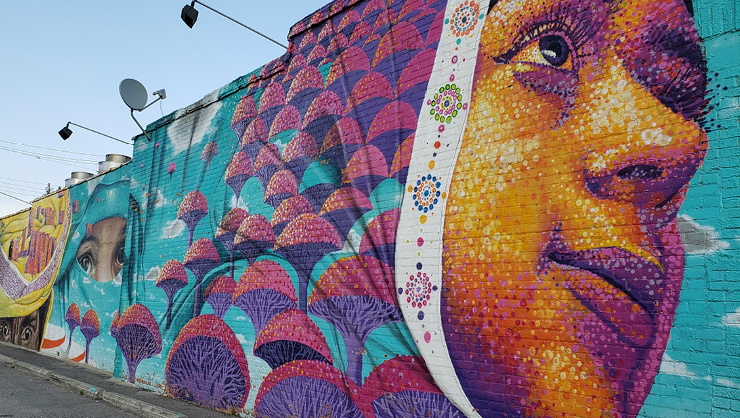The disproportionate toll of the COVID-19 pandemic on women and minorities, coupled with the global outrage at the horrific killing of George Floyd has brought the issue of systemic inequality into mainstream conversation. As America struggles to reinvent itself amidst the strictures of the pandemic, Nina Ansary asks why is systemic change so important? And what should that change look like?
Here in the US, as in so many countries, wage discrimination and legal and professional barriers embedded in society have kept approximately half the population from achieving its full potential. At the same time, racial, ethnic, and socioeconomic discrimination have created nearly insurmountable barriers for minorities, particularly minority women.
The result is a society that reflects the vision and capabilities of only a fraction of human potential – an imbalanced society that cannot possibly weather the upheaval of something as pervasive as a global pandemic or a shocking display of racism. This brings forth the urgent need for systemic change – one which requires policies aimed at transforming how society functions as a whole, including fostering a culture of diversity and inclusivity beyond narrow reforms that are at best limited in scope and even worse, continue to perpetuate entrenched biases.
While the pandemic has left none of us untouched, it has impacted some of us far more than others. It has laid bare the systemic inequalities that divide rather than unite us, contributing to an ongoing debilitating cycle of repression. Today women not only hold nearly two-thirds of the lowest-wage jobs in America, but also head approximately 80% of the 11 million single-family homes. They shoulder a disproportionate amount of both child and elderly care, enjoy less workplace protections, and have less savings to fall back on. It is no coincidence then, that today many more women than men are struggling to put food on the table, while also risking infection in the nation’s grocery stores and restaurants.
While the pandemic has left none of us untouched, it has impacted some of us far more than others. It has laid bare the systemic inequalities that divide rather than unite us, contributing to an ongoing debilitating cycle of repression.
Even among women, vast disparities exist. For example, nearly a third of women working in the service jobs most vulnerable to the pandemic are black, compared to just one-fifth being white women. This puts black women at the intersection of both gender and racial bias. And it raises the larger notion of systemic racism, which has given rise to Black Lives Matter protests around the nation. The need for systemic change – for a concerted effort to place all members of society on equal footing – has never been more urgent.
Promoting diversity and inclusivity across gender, racial, and ethnic lines will help to heal the nation’s divides and unleash a wellspring of untapped potential. Today, a growing body of research indicates that diversity is not just a political, social and moral issue, but an economic one as well.
As a nation, we have become increasingly aware of the ethical imperative for diversity and inclusivity, but given its subjective nature and the fact that in the current climate America seems to have lost much of its moral authority, the economic benefits are measurable, objective, and something we can all recognise and agree upon. According to a 2017 study by the Institute for Women’s Policy Research, closing the gender pay gap alone would add $513 billion to the national economy.
For example, supporting female entrepreneurs reaps substantial dividends. A Boston Consulting Group study found that when it comes to converting investment dollars into revenue dollars, companies founded or cofounded by women perform more than twice as well as companies founded by men. Yet, female entrepreneurs receive just two percent of all venture capital funding. Imagine the domino effect if that percentage were increased to fifty.
Ample evidence also points to the economic benefits of diversity across racial and ethnic lines. A 2017 study by McKinsey & Company found that companies with ethnically and culturally diverse leadership teams are 33% more likely to generate industry-leading profitability. Research shows that in today’s fast-changing, multifaceted world, diverse teams are better equipped to deal with complex problems. What could be more complex than finding a way to safely reopen virtually every sector of our economy – from schools to airports to convention centers – amid the stringent parameters of a pandemic?
Systemic change will not happen without targeted action. A combination of political will and partnership between the private sector and human rights organisations will be necessary to implement concrete solutions, such as gender and diversity budgeting, quotas, and legislation. We must confront wage discrimination head-on and increase diversity at the upper echelons of industry and academia. We must improve access to education and healthcare across racial, economic, and gender lines. And we must rewrite social norms, including investing in and placing a higher value on domestic work and childcare.
We must improve access to education and healthcare across racial, economic, and gender lines. And we must rewrite social norms, including investing in and placing a higher value on domestic work and childcare.
Throughout history, some of the most tumultuous and tragic periods have led to chapters of profound progress and rebirth. At this unprecedented moment we have all been called to rethink our relationships with technology, political and economic systems, the environment, and perhaps most fundamentally – each other.
As the nation pushes forward to heal, it is imperative to abandon the debilitating cycle of repression that has held so many back and take steps to ensure that the differences that define us – whether they relate to gender, race, or ethnicity – are equally valued and embraced. America does not need a restart. We need to start over.
The views, thoughts and opinions expressed in this blog post are those of the author(s) only, and do not necessarily reflect LSE’s or those of the LSE Centre for Women, Peace and Security.
Image credit: Charles Deluvio






“America does not need a restart. We need to start over.” – How very true. Thank you Dr. Ansary for writing this blog. I very much enjoyed reading it.
Congratulations , proud of you dear Nina and all of university team for another great event .You are beautiful light of hoppness for present and future and for a better world 🌎 👏👏👏 Gius
Thank you . We have the opportunity in this moment to begin a new……. more so than in a very long time . This social working Grandmother is more than ready to jump in …… and kick some ass !
I agree that during this tumultuous period of a worldwide pandemic that specific roles emerge that begin to show the disparities in contemporary society especially among so called minorities and minority women in particular! As a black man that was raised by an incredibly strong single mother I do understand the Dynamics at play because she stood in the face of despairity to become a great positive influence in the black community as an Evangelist and Pastor of her own flock for over 30 years! She led us from dirt clod southern poverty to prosperity in the north from Jim Crow Segregation to the ideal of competitive integration by teaching that with a proper education there was no limit to how far we could go! But the most important lessons that she taught was moral and spiritual applications in everyday life! It’s a sad commentary on where women’s rights are today with unfair disparities in wages as well as the important role they play to the overall survival of our community as well as all women across all races and cultures have struggled to raise future generations to strive to bring about equality in all areas of competition against all odds! Thank you Dr Nina for your great insight on the reality of the desparities when it comes to women across the board in all segments of society including desparities in the job market on all levels!!!